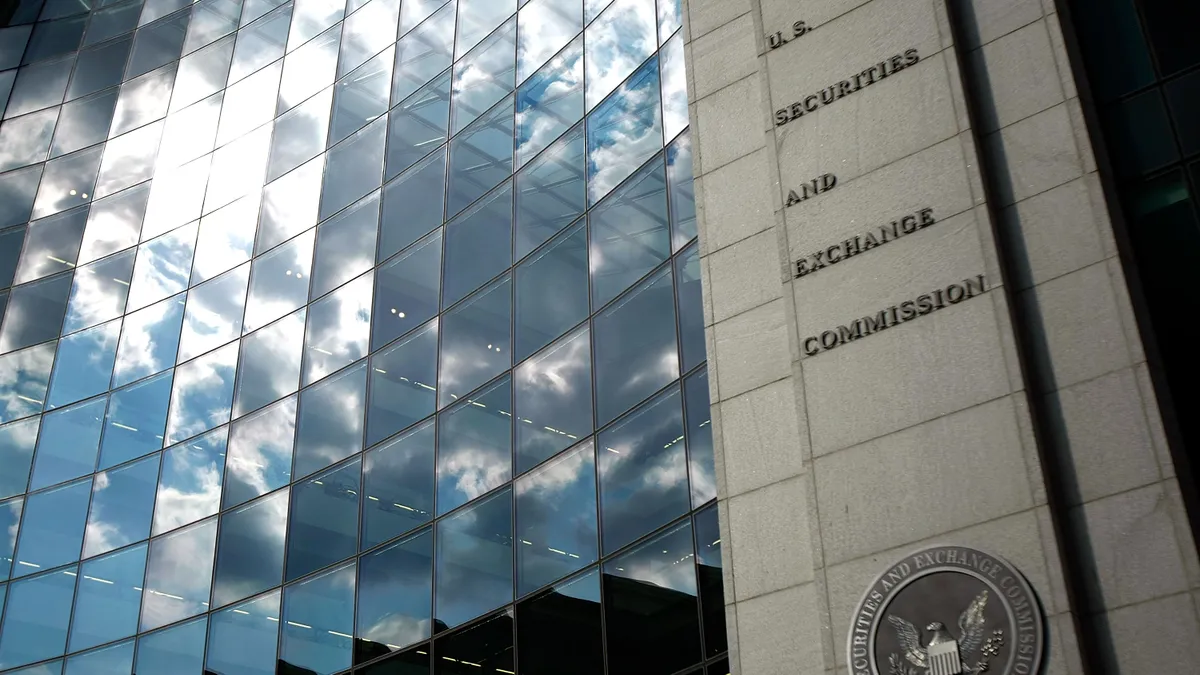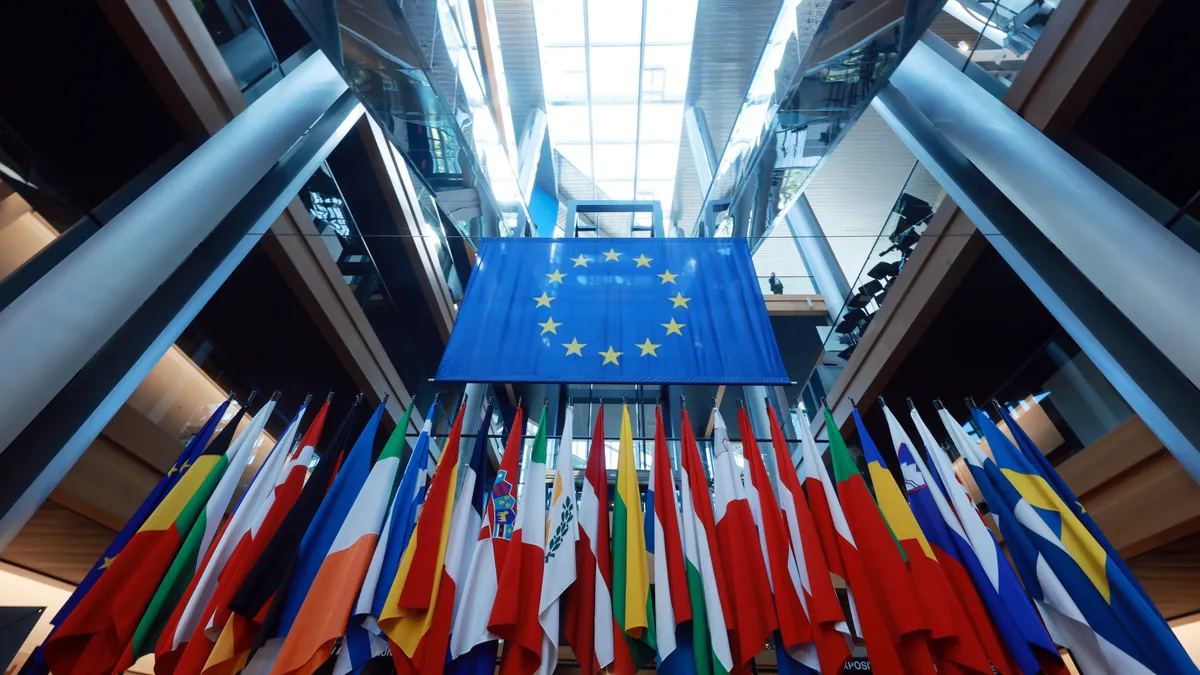The Securities and Exchange Commission is still fighting to protect its climate risk disclosure rule in the U.S. Eighth Circuit of Appeals, and organizations have lined up to support the arguments for and against the agency’s right to promulgate the rule.
The SEC’s rule is facing nine petitions from 25 states, an energy trade association, two think tanks and public oilfield services company Liberty Energy and one of its subsidiaries. The agency recently responded with a nearly 25,000-word response, where it maintained its authority to issue the rule and said the plaintiffs’ assertions to the contrary “misapprehend the relevant statutes and mischaracterize the rules.”
The amicus briefs filed in the court over the last few months reveal battle lines and insights into the thinking of both businesses and investors on the SEC’s rule to require climate risk disclosures.
As of Aug. 20, 13 briefs were submitted by a total of 48 groups opposing the rule, and 17 amici and 18 states filed 11 briefs in support, according to court documents.
Some influential business trade associations filed briefs opposing the rule in June, with arguments including that the rule exceeds statutory authority, disincentivizes climate target-setting or draws in climate disclosures mandated by other laws.
Meanwhile, a group of institutional investors representing more than $2 trillion in assets — including the nation’s largest public pension fund — joined public interest and environmental nonprofits, corporate climate coalitions and carbon offset experts supporting the rule in briefs filed Aug. 15.
Business groups help oppose the rule
In June, the Business Roundtable, National Association of Wholesaler-Distributors and the American Chemistry Council — which represent some of the largest U.S. companies, wholesale distributors and chemical manufacturers — filed amicus briefs opposing the rule. Their oppositional friend of the court briefs joined one filed by the states of Kansas and Florida, a group of legal and finance scholars and multiple right-leaning think tanks and nonprofits.
Some of the arguments against the agency’s right to promulgate the rule mirror the ones filed by the named parties, but the trade associations’ arguments offer some differences and the views of groups representing large swaths of businesses and industry.
Business Roundtable — an association of over 200 CEOs that represent nearly a quarter of the U.S. gross domestic product — argued the agency’s rule doesn’t have a clear statutory authority and is not reasonably explained. The group maintains its members are “committed to combating climate change,” and “leading the way in transparent, voluntary” climate disclosures. However, Business Roundtable CEO Joshua Bolten also called the rule an “example of the SEC’s unwarranted overreach” in a June press release announcing the filing.
“Following a thorough review of the SEC’s climate disclosure rule, Business Roundtable has concluded that the final rule is counterproductive and beyond the SEC’s statutory authority,” Bolten said in the release.
In addition to arguing the rule is arbitrary and capricious, the National Association of Wholesaler-Distributors said the rule will harm businesses, particularly private small and medium companies. The group, which represents over 250,000 U.S. wholesale distribution companies, said the cost of the regulation, while focused on large public companies, will “cascade down to impose significant indirect burdens on business throughout the supply chain.”
The American Chemistry Council’s argument takes a different tact entirely, arguing the SEC’s rule will discourage public companies from setting climate-related targets. The chemical manufacturer’s group also argued the rule could require companies to either include all information disclosed to other jurisdictions — such as the broader-ranging climate disclosure rules in California or the European Union’s climate reporting laws — or create distinct and separate disclosures for each, potentially risking allegations they omitted material information.
“Companies may therefore need to combine disclosures to ensure consistent and efficient reporting, effectively converting non-binding additional disclosures required under other existing — and future — regimes into binding securities-law backed duties with concomitant liabilities,” the American Chemistry Council said in the filing.
Institutional investors join blue states and nonprofits to support the rule
The SEC has long maintained its climate-risk disclosure rule was promulgated in response to the demands of investors, and institutional investors helped support that claim with an amicus brief whose signatories included the California Public Employees’ Retirement System, the nation’s largest pension fund. The investors said the Aug. 15 brief was submitted to relay the rule’s “urgency and importance to investors.”
The other institutional investors representing $2 trillion in assets include the New York City Comptroller's Office, California’s teachers’ pension fund, Oregon’s state treasurer’s office, 16 other investment firms and the environmental nonprofit Ceres — representing its investor network. The group’s brief said the current landscape of climate-risk disclosures is “deficient,” and the final rule is “responsive to investor needs.” The investors said they will use the information from the required disclosures to decide how to allocate their capital and cast proxy votes.
“As to those who have claimed that the information would “not be useful” to them, the response is simple enough: Investors who do not wish to use the information are not obligated to do so,” the brief said.
The SEC’s argument was also aided by a group of carbon offsets experts, including academics and subject matter experts at climate advocacy group the Clean Air Task Force. Their brief said the disclosure of carbon offset use could be “a material concern for investor decision-making, in certain circumstances.”
The SEC’s final rule would require carbon offset use when used “as a material component” to their plans to achieve climate-related goals. The carbon offset experts noted there have been continued questions about the varying reliability of carbon credits. Recent research from the Science Based Targets Initiative found there are “clear risks” to companies using carbon credits to offset emissions.
“Public companies that rely on carbon offsets face financial, reputational and regulatory risks that should be disclosed,” the brief from the carbon market experts said.
The rule was also supported by a pair of environmental groups in the Sierra Club and Natural Resources Defense Council who at one point were parties to the lawsuit. The nonprofits had initially protested the agency removing provisions that required scope 3 emissions reporting and slimmed the universe of scope 1 and 2 emissions reporting companies but later dropped their suits in June. The two nonprofits joined the Americans for Financial Reform Education Fund, the Environmental Defense Fund and Earthjustice on an amicus brief in support of the agency’s authority.
"Climate-related risks are widespread, and the SEC's disclosure requirements will give investors information that they need to manage those risks,” Tom Zimpleman, senior attorney at NRDC, said in an Aug. 15 release sent to ESG Dive. “Consistent and comparable disclosures will benefit investors and the capital markets, and they are well within the SEC's mission and authority."
The CEO-led nonprofit World Business Council for Sustainable Development North America — whose members represent 70 “mostly U.S.-based Fortune 500 corporations” in North America — filed a supporting brief with net-zero advocacy-focused nonprofit Center for Climate and Energy Solutions, a corporate climate advocacy group the We Mean Business Coalition. The agency’s rule was also supported by legal and First Amendment scholars, financial reform and consumer protection groups in other briefs.
While the SEC is the only named defendant, 18 states and the District of Columbia are listed as intervenors — recognized by the court as having a statutory right to participate — and also filed by Thursday’s deadline, with a brief supporting the SEC’s legal right to promulgate the rule and its process. California, not among those states and facing legal challenges over its own climate risk disclosure laws, also filed an amicus brief in support of the rule.
What’s next?
Following the SEC’s response brief, the plaintiffs in the case will have until Sept. 17 to file their reply briefs to the court.



















